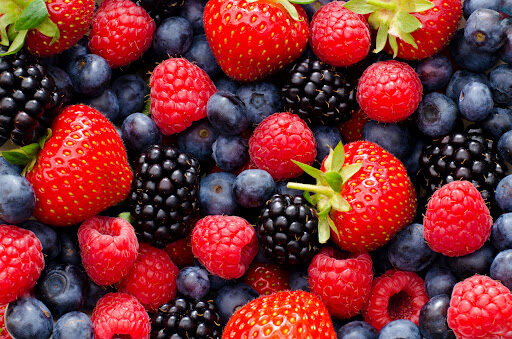Chronic inflammation is common, and can increase the risk of a number of health conditions, including heart disease, diabetes, liver issues, and cancer. 1 2 3 4 Adding more of the following foods to your diet can help reduce inflammation and boost your health.
Berries
Berries, including blackberries, strawberries, blueberries, and raspberries, are packed with nutrients and contain anthocyanins, antioxidant compounds that have anti-inflammatory properties. 5 One study found that overweight adults who regularly consumed strawberries had lower levels of inflammatory markers associated with heart disease than those who did not consume strawberries. 6 In another study, adults who consumed blueberry powder every day produced more natural killer (NK) cells than those who did not. NK cells are naturally produced by the body and are a key component to proper immune function. 7
When choosing berries, look for produce grown organically and in season.
Green Tea
Green tea is known for its health properties and its potential ability to reduce the risk of a number of diseases, including cardiovascular disease, cancer, and Alzheimer’s disease. 8 9 10 Much of green tea’s impact on health comes from its anti-inflammatory properties. The bioactive compounds found in green tea reduce the formation of free radicals in the body, potentially preventing inflammation. 11 Organically grown green tea is best consumed without added sweeteners.
Turmeric
Turmeric has been used in ayurveda and traditional folk medicines for centuries. Modern science also prizes turmeric for its medicinal properties, particularly as an anti-inflammatory agent. 12 Turmeric contains the compound curcumin, which is very effective at reducing inflammation. 13 Curcumin is easier for the body to absorb when paired with piperine, an alkaloid found in black pepper. 14
Extra Virgin Olive Oil
Extra virgin olive oil is a staple in the popular Mediterranean diet, which has a number of demonstrated health benefits. All olive oil has some anti-inflammatory properties, but cold-pressed, extra virgin olive oil has the greatest ability to reduce inflammation. 15 Research has found that participants who consumed 1.7 ounces of extra virgin olive oil every day for one year showed a significant decrease in inflammatory markers. 16
Foods to Avoid
In addition to adding more of the above foods to your diet in order to reduce inflammation, limit or avoid these inflammatory foods:
- Processed meats
- Alcohol
- White bread/flour
- Sugary drinks
- Artificial sweeteners and preservatives
- Produce with pesticide residue
- Processed, salty snacks such as potato chips and pretzels
- Fried foods such as donuts and french fries
Tips to Add More Anti-Inflammatory Foods to Your Diet
Make a fresh fruit salad with a combination of your favorite berries. Add lime juice and some fresh mint for a flavorful kick.
Sip a cup of green tea once a day (avoid later in the day if you are sensitive to caffeine).
Add turmeric powder to your morning smoothie or latte.
Use extra virgin olive oil in salad dressing recipes, for grilling or roasting vegetables, and for drizzling on pasta.
If you choose to take a curcumin supplement, choose one that contains piperine to ensure that your body will absorb it well.
Top yogurt or oatmeal with fresh berries for a healthy, anti-inflammatory breakfast.
Add tumeric along with black pepper to aromatic recipes such as curries and stir-fries for added flavor and anti-inflammatory benefits.
Add chilled green tea to your favorite lemonade recipe for a refreshing summer beverage.








